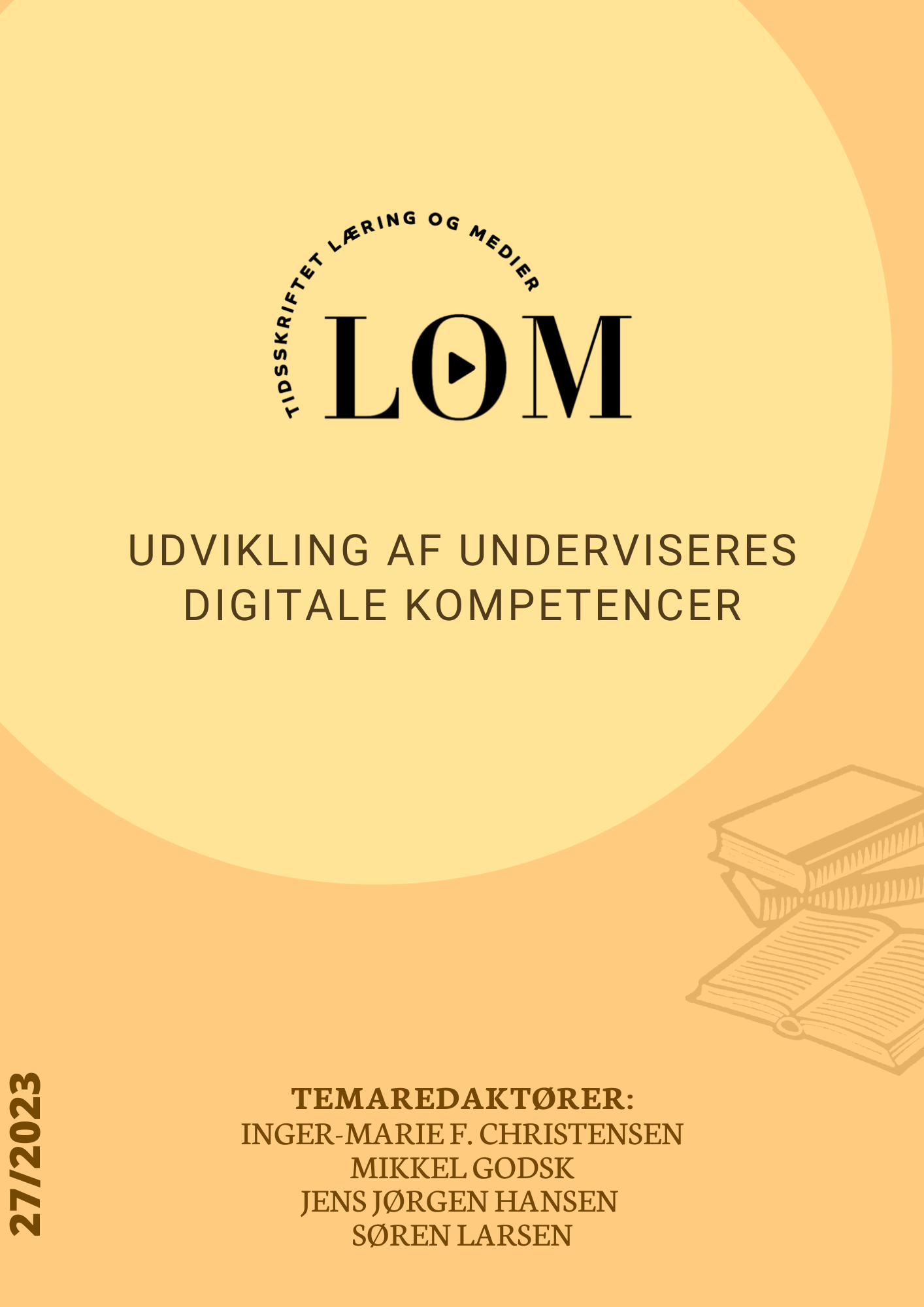Bidrag til digital didaktik set fra et posthumant elevperspektiv
DOI:
https://doi.org/10.7146/lom.v15i27.135507Keywords:
grundskole, digital didaktik, posthumanisme, casestudieAbstract
This article contributes to research in digital didactics with a special focus on a situated student perspective. Using two cases taken from a three-year Nordic research project Connected Classroom Nordic (QIUINT), we provide examples of how technology can be the starting point for a digital didactic in a student perspective. Typically, in digital didactic research a sharp distinction is made between human/student and technology, but the result is that it is neither the didactics nor the technology that determines the digitization of the school. In this article, we build a theoretical focus that allows us to observe technologies as entangled with students' social and professional capacity. Our interest in student-technology is the possibility of the openness and unpredictability that lies in what we call rupture, which we place in teaching in the student-technology relationship. Our study indicates that didactic opportunities arise when students-technology are allowed to shape themselves in new ways in teaching. But at the same time, the study also shows that the entanglement of student technology and situations where breaches occur are easily overlooked as a potential of a busy teaching everyday life.
Downloads
References
Blikstad-Balas, M., & Klette, K. (2020). Still a long way to go Narrow and transmissive use of technology in the classroom. Nordic Journal of Digital Literacy, 15(1), 55-68. https://doi.org/10.18261/issn.1891-943x-2020-01-05
Carlsen, D. (2021). Danskdidaktiske forståelsesmåder. Ph.d.-afhandling. DPU/Aarhus Universitet.
Cuban, L. (2018). The flight of a butterfly or the path of a bullit. Harward.
Danholt, P. (2021). Technology Comprehension in a More-Than-Human World. Learning Tech – Tidsskrift for læremidler, didaktik og teknologi, 6(10), 169-190. https://doi.org/10.7146/lt.v6i10.125722
DeLanda, M. (2006). A new philosophy of society: Assemblage theory and social complexity. Continuum.
Deleuze, G. (2006). Forhandlinger. Det lille Forlag & Samlerens Bogklub.
Deleuze, G., & Guattari, F. (1987). A thousand plateaus: Capitalism and schizophrenia (B. Massumi, Trans.). University of Minnesota Press. (Original work published 1980)
Elf, N. (2021). The Surplus of Quality: How to Study Quality in Teaching in Three QUINT Projects. In M. Blikstad-Balas, K. Klette, & M. Tengberg (Eds.), Ways of Analyzing Teaching Quality: Potentials and Pitfalls (pp. 53-88). Scandinavian University Press. https://doi.org/10.18261/9788215045054-2021-02
Flyvbjerg. B. (2010): Fem misforståelser om case-studiet. In S. Brinkmann & L. Tanggaard (Eds.), Kvalitative metoder. Hans Reitzels Forlag.
Gissel, S. T., Carlsen. D., Buch. B., & Illum Skov. L. (2021). Læremidler og læremiddelbrug i L1 i Danmark: læreres ibrugtagning, didaktisering og redidaktisering af didaktiske, semantiske og funktionelle læremidler i danskundervisningen. Learning Tech - Tidsskrift for læremidler, didaktik og teknologi, 6(9), 80-119. https://doi.org/10.7146/lt.v6i9.124762
Hansen, J. J., & Nørgård, R. T. (2022). Hvad er digital pædagogik? Konturer af et nyt praksis- og forskningsfelt. Dansk Universitetspædagogiske Tidsskrift, 17(32), 107-128. https://doi.org/10.7146/dut.v17i32.129582
Hansen, R., Slot, M. F., & Bremholm, J. (2016). Elevopgaver og elevproduktion i det 21. århundrede: en kvantitativ analyse af elevproduktion i matematik, dansk og naturfag (Endline). Nationalt videncenter for læremidler - Læremiddel.dk. https://laeremiddel.dk/wp-content/uploads/2015/06/2605_rapport_kvantitativanalyse_enk.pdf
Hickey-Moody, A. C., & Malins, P. (2007). Deleuzian encounters: Studies in contemporary social issues. Palgrave.
Jensen, M. (2023). Affektiv literacy og digitale teknologier. Når vi skriver og læser med maskiner. Learning Tech – Tidsskrift for læremidler, didaktik og teknologi, 8(13), 126-148. https://doi.org/10.7146/lt.v8i13.133073
Johansen, A. (2008). Stjerneskælv. Modtryk.
Kress, G. (2010). Multimodality: A social semiotic approach to contemporary communication. Routledge.
Levinsen, K. T., & Sørensen, B. H. (2020). It-didaktisk design. Frydenlund.
MacLure, M. (2010). The offence of theory. Journal of Education Policy, 25(2), 277–286. https://doi.org/10.1080/02680930903462316
Massumi, B. (2002). Parables for the virtual: movement, affect, sensation. Duke University Press.
Mazzei, L. A., & Jackson, A. Y. (2019). Voice in the Agentic Assemblage. Qualitative Inquiry at a Crossroads: Political, Performative, and Methodological Reflections, 49(11), 67–79. https://doi.org/10.1080/00131857.2016.1159176
Ryberg, T. (2021). Historisk blik på uddannelsesteknologi og online undervisning. Kognition & Paedagogik, 31(122), 8-19.
Selwyn, N. (2016). Minding our language: why education and technology is full of bullshit… and what might be done about it. Learning, Media and Technology, 41(3), 437-443. https://doi.org/10.1080/17439884.2015.1012523
Slot, M. F., Lorentzen, R. F., & Hansen, T. I. (2021). Hvordan integreres teknologiforståelse i dansk? Learning Tech – Tidsskrift for læremidler, didaktik og teknologi, (10), 21-46. https://learningtech.laeremiddel.dk/wp-content/uploads/2021/11/Learning-Tech-10_Artikel-1.pdf
Tannert. M., & Berthelsen. U. D. (2020). Digitale læremidler i dansk. Pædagogisk indblik. Aarhus Universitetsforlag.
Tække, J., & Paulsen, M. (2016). Undervisningsfællesskaber og læringsnetværk i den digitale tidsalder. Unge Pædagoger.
Tække, J., & Paulsen, M. (2019). Digitalt understøttet faglighed og almendannelse. Bog 2, Analyser og indblik. Unge Pædagoger.
Tække, J., & Paulsen, M. (2022). A New Perspective on Education in the Digital Age: Teaching, Media and Bildung. London: Bloomsbury Academic.
Veletsianos, G., & Moe, R. (2017). The rise of educational technology as a sociocultural and ideological phenomenon. https://er.educause.edu/articles/2017/4/the-rise-of-educational-technology-as-a-sociocultural-and-ideological-phenomenon. Hentet 30/11 2021
Vygotsky, L. S. (1978). Mind in society: The development of higher psychological processes. Harvard University Press
Zuboff, S. (2023). Overvågningskapitalismens tidsalder. Informations Forlag.
Yin, R. K. (2018). Case-Study Research and Applications: Design and Methods (6th ed.). Sage.
Downloads
Published
How to Cite
Issue
Section
License
Copyright (c) 2023 Marie Falkesgaard Slot

This work is licensed under a Creative Commons Attribution-NonCommercial-NoDerivatives 4.0 International License.

Articles published in the Journal of Learning and Media are licensed under a Creative Commons Attribution-NonCommercial-NoDerivatives 3.0 Unported Licens.
Authors retain copyright and grant the journal right of first publication; simultaneously articles are licensend under the Creative Commons Attribution license: Attribution-NonCommercial-NoDerviatives (by-nc-nd). Read about this license at https://creativecommons.org/licenses/by-nc-nd/3.0/
---
At LOM.dk, you will also find articles from the discontinued Journal for the Continuing and Further Education of the Danish Universities (UNEV). Note that special rules apply to UNEV articles:
It is the authors and any other copyright holder who have the copyright of articles published under the auspices of UNEV, and access to the articles is contingent on users acknowledging and complying with the associated legal guidelines:
- Users may download and print one copy of any UNEV publication for private studies or research.
- The redistribution of articles or the use of these for revenue-funded activities or commercial purposes are not allowed.
- It is not allowed to distribute the URLs of UNEV articles.


